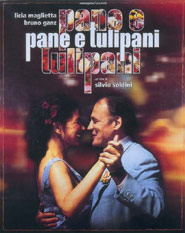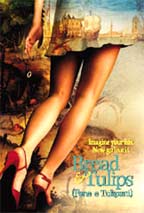|
Bread and Tulips
aka Pane e tulipani
|
| |
 |
Italian language. Italy/Switzerland,
2000. Rated PG-13. 112 minutes.
Cast: Licia Maglietta, Bruno Ganz,
Marina Massironi, Giuseppe Battiston, Felice Andreasi, Antonio Catania,
Vitalba Andrea, Daniela Piperno, Tatiana Lepore, Tiziano Cucchiarelli,
Matteo Febo, Silvana Bosi
Writer: Doriana Leondeff, Silvio Soldini
Music: Giovanni Venosta
Cinematographer: Luca Bigazzi
Producer: Daniele Maggioni
Director: Silvio Soldini
LINKS
|
 read
and Tulips is a slight film. A light comedy that covers old ground, it's
the oft-told story of a woman escaping from the prison of a bad marriage and
an unappreciated duty-bound existence as a housewife to blossom suddenly in
middle age. It may surprise you to learn that Bread and Tulips won nine
the Italian Academy Awards (the David Di Donatello awards) last year. Though
there's no denying that Bread and Tulips is just a feel-good movie, it
is a delightfully executed, simple, and unassuming film, not drowned in cloying
syrupiness like most Italian films that have made it Stateside over the past
ten years.
read
and Tulips is a slight film. A light comedy that covers old ground, it's
the oft-told story of a woman escaping from the prison of a bad marriage and
an unappreciated duty-bound existence as a housewife to blossom suddenly in
middle age. It may surprise you to learn that Bread and Tulips won nine
the Italian Academy Awards (the David Di Donatello awards) last year. Though
there's no denying that Bread and Tulips is just a feel-good movie, it
is a delightfully executed, simple, and unassuming film, not drowned in cloying
syrupiness like most Italian films that have made it Stateside over the past
ten years.
As Bread and Tulips opens, we meet Rosalba Barletta (Licia Maglietta),
a woman in her early forties on vacation in Southern Italy with her family.
Abandoned at a highway rest area by the tour bus, she hitches a ride rather
than waiting for her family to return. Instead of going home, however, she heads
to Venice, intending to stay only a couple days. A couple days turns into a
couple weeks, and then a couple months. She winds up lodging with a waiter of
Icelandic origin, Fernando (Bruno Ganz from Wings of Desire, whose mother
is Italian), striking up a friendship with her neighbor, a New-Age masseuse
named Grazia (Marina Massironi), and working at a flower shop. Meanwhile, her
overbearing husband, Fermo (Felice Andreasi), hires a plumber, Costantino (Giuseppe
Battiston), to go to Venice to locate his wife, or more accurately from his
point of view, his missing property.
AboutFilm.Com
The Big Picture
|
| Alison |
-
|
| Carlo |
B+
|
| Claudia |
B+
|
| Dana |
-
|
| Jeff |
-
|
| ratings explained |
Although not enough time is spent establishing Rosalba's relationship to her
husband and her two teenaged children, the plot is functional. The charm of
Bread and Tulips is in the charm of the actors, particularly Maglietta,
who, with a calm performance, conveys the sense of a flower blooming--a prevalent
visual motif representing Rosalba. Nothing is essentially different about Rosalba,
but Maglietta subtly invests her with vitality as the film progresses. For those
who might wonder why Rosalba has a few lines on her face, why her skin isn't
pulled taut over her cheeks, or why she doesn't have the physique of a runway
model, it is because this particular early middle-aged character is actually
played by an early middle-aged woman. She may not be twenty-five anymore, but
Maglietta is a beautiful woman, and she shines brightly.
There are occasions when Bread and Tulips threatens to become a farce,
but it consistently declines the opportunity to do so. At the beginning, for
example, Rosalba drops an earring into a toilet at the rest area. She tries
to fish it out with a pair of eyebrow tweezers, then drops the tweezers as well
and tries to use other implements. Rosalba's reactions are the exasperation
of a real person, not the overblown machinations of a clown like Roberto Benigni.
Similarly, director and co-writer Soldini doesn't dwell on the situation. Instead
of showing the resolution of the scene (with Rosalba physically climbing into
the toilet or something), Soldini cuts away to show Rosalba exiting the rest
area, shaking herself off, only to discover that her bus is leaving with her
family on board. The movie again contemplates a farcical turn when Chris Farley-look-alike
Costantino appears, whose qualifications for detective work are that he has
read nearly three hundred detective novels. Nevertheless Soldini refuses to
indulge in wacky antics, which would diminish the realism he is striving for.
It's important to note that though the thematic content may be old hat to U.S.
audiences, the feminist movement and sexual revolution were never as strong
in Italy as in the United States. The role of women has not changed as much
in Italy. It certainly is changing, but there are still are many more women
in Italy who stay at home not because they choose to, but because it is what
is culturally expected. If a movie's message is important to you, Bread and
Tulips is timelier than it may seem, particularly in a world where Fermo's
mistress can realistically lecture Rosalba about her familial responsibilities.
One can probably attach symbolic significance to the film's opening in the
magnificent Greek ruins at Paestum (south of Naples), where the tour guide makes
Mussolini-esque proclamations about Italians being the heir to the cultures
of Greece and Rome. Perhaps by choosing this location, Soldini is saying the
old cultural definitions of family and gender roles are also in ruins. Or perhaps
it's not much fun to delve this deeply into the symbolism of a light comedy.
One last thing about symbolism, though: Fernando's last name (oddly not Icelandic)
is "Girasoli," which means "sunflowers," so when you see sunflowers, you'll
know what the film is alluding to.
Sadly for U.S. audiences, part of the delight of Bread and Tulips is
in the language. Foreign comedies, particularly non-farces, translate worse
than dramas. Subtitles summarize, generalize, skip detail, and lose the nuance
of the original language, so essential to most comedy. Take Fernando, for example.
Speaking with an accent, he talks like he has learned Italian out of a 19th
century butler's handbook (or at least the classics of literature, which he
often quotes), but only about half of the baroque language comes through in
the subtitles. For an audience without the benefit of understanding the original
language, the movie may more accurately rate a B or B-. Even with
that handicap, most people should find plenty to enjoy. There are comedies that
make you laugh out loud, and comedies that just make you smile. Sometimes, the
ones that make you smile are the ones that stay with you the longest.
Review
© September 2001 by AboutFilm.Com and the author.
Images © 2001 First Look Pictures. All Rights Reserved.


